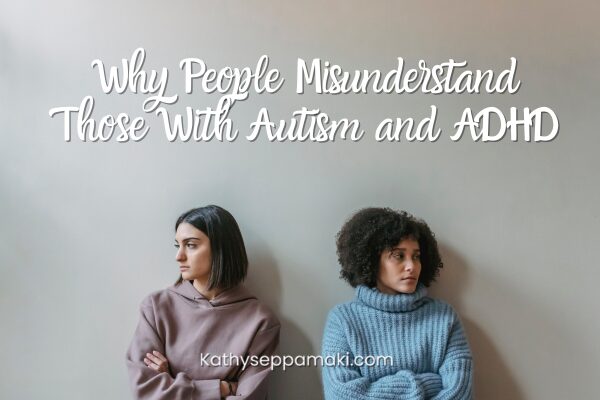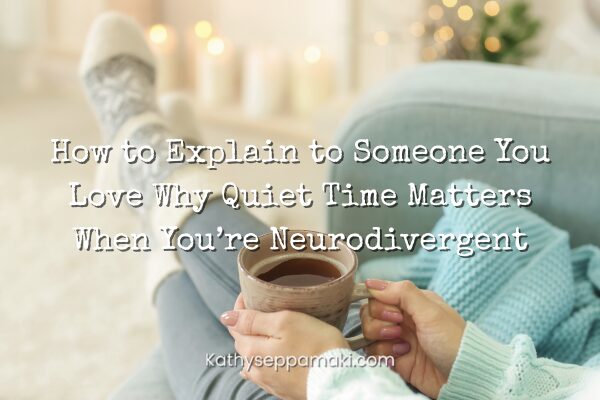Do you have autism or ADHD and feel like people constantly misunderstand you? You’re not alone!
I spent my life feeling misunderstood by people. People would get angry at me over something, but I never really understood what I did. It’s hard to explain what it’s like to go through life constantly misunderstood. But for many of us with autism and ADHD, it’s an everyday reality. We often feel unseen, misjudged, or even blamed for things that come down to how our brains are wired. When this happens, it is hurtful, frustrating, and confusing.
For decades, it led me to believe that somehow I was a bad person. But I wasn’t bad…just different. And others expected me to react and respond a certain way. But my brain wasn’t designed to do that. So I wound up in trouble, or even worse, rejected by others because they couldn’t understand my brain’s processing system.
So why does this happen? And what kind of impact does it really have?
Let’s talk about it.
Why people misunderstand autism and ADHD
Knowing that I have ADHD and autism was such a relief to me. Because it broke down the idea that I am somehow a “bad person”. It helped me to understand that the misunderstandings of others were not my fault. I didn’t do anything wrong. It was just a lack of understanding from others. But why does that happen?
Misunderstanding often comes from a lack of awareness, outdated beliefs, or a tendency to judge by what’s visible on the surface. Here are some of the most common reasons:
Outdated stereotypes
People still picture autism as a nonverbal boy lining up toys or ADHD as a little kid bouncing off the walls. And they still often have a difficult time seeing a woman as autistic. Women have been relatively invisible in the neurodivergent world. These narrow portrayals completely miss the rich, diverse, and nuanced reality, especially for adults, women, and marginalized folks. Fortunately, that is beginning to change. More and more women and marginalized people are uncovering their ADHD and autism. It helps a great deal to have more people from those groups speaking out about their own experiences with neurodivergence.
Masking hides the struggle
I am not going to lie…I am the queen of masking. I have become frighteningly good at masking. Years of acting onstage have allowed me to perfect my masking ability. So many of us have learned to mask, putting on a socially acceptable version of ourselves just to survive. We fake eye contact, force ourselves to sit still, or mirror the behavior of those around us. This makes our struggles invisible, and people assume we’re “fine.” I have masked during some of the most challenging and difficult times of my life. And no one knew. They had no clue how much I was struggling.
Internal battles are invisible
You can’t see executive dysfunction. You can’t see someone’s internal monologue rehearsing a conversation 50 times. Or the sensory overload from bright lights or itchy clothing. So people assume we’re overreacting or making it up. I can’t tell you how many times that even family members accused me of “faking it”, “using struggles as an excuse”, or “just being dramatic”. None of them knew how difficult so many things in my life are for me. Partly because my masking has me putting a smile on my face and acting like everything is okay, even when it isn’t.
It looks like “Bad behavior”
Interrupting, zoning out, fidgeting, and missing social cues—these things are often seen as rude or disrespectful rather than as signs of neurodivergence. I used to get in trouble all the time in school because I struggled to focus. I was constantly told by teachers and my parents that I just needed to “apply myself.”
Lack of education
Most people simply haven’t been taught what autism or ADHD really look like, especially in adults. They don’t know that we can be bright, verbal, creative, and still deeply struggle.
How does it impact neurodivergent people when others misunderstand us?
Being misunderstood isn’t just frustrating. It can have real, lasting effects on our mental, emotional, and physical well-being.
Chronic shame and self-doubt
When you’re constantly told you’re “too much” or “not enough,” you start to internalize it. Many of us grow up believing something is wrong with us when really, we’re just different.
Late or missed diagnoses
Especially for women and AFAB folks, masking and mislabeling often lead to diagnoses later in life, if at all. That means years of not getting the support we need. I was 55 when I found out that I have AuDHD. In my life before that, I never would’ve believed that either ADHD or autism could be a part of my life. But as I found out more about both, suddenly my life made sense. Now I can see SO many others who are neurodivergent and have absolutely NO clue that so many of their struggles are because of that.
Anxiety, depression, and burnout
Living in a world that wasn’t built for your brain is exhausting. Constant masking, rejection, and judgment take a toll, often leading to mental health crises or emotional shutdown. For a long time, I couldn’t understand why I would have periods where I was very productive, and then I would just shut down and struggle to function. I didn’t understand burnout and how it impacted me. And how much my experiences contributed to a lifetime of depression and anxiety.
Relationship struggles
Miscommunication and unmet expectations can hurt relationships with partners, family, and friends. It’s easy to feel lonely or misunderstood, even when you’re not physically alone. And this can be even worse for those who go undiagnosed until later in life. It is difficult for those in your life to understand you when you are struggling to understand yourself. My relationship with my father was strained for much of my life because he misunderstood me a lot. And he held unrealistic expectations about me as well…expectations that I could never live up to. I was married for 9 years. During that time it was common for my now ex-husband to misunderstand me. He tried to force me to be more “neurotypical”. But I was never going to be able to be what he wanted me to be. I’ve certainly experienced plenty of other times when a friend, colleague, or teacher would misunderstand me.
Barriers to success
Many neurodivergent people struggle in school or work, not because they’re not smart or capable, but because the systems aren’t designed for their brains. Without accommodations or understanding, we’re set up to fail. But with the right accommodations in place, we can not only succeed, we can thrive!
What Can We Do About It?
If you’re neurodivergent, know this: you are not broken.
And if you’re someone who wants to better understand the people in your life with ADHD or autism, here’s where to start:
-
Listen to lived experiences. Listen to experiences, especially from women, BIPOC, and LGBTQIA+ folks. There are some great content creators online! They can teach you a lot!
-
Challenge the stereotypes- Just because you’ve been taught certain stereotypes doesn’t mean you can’t change them!
-
Stop expecting people to mask. It is not a neurodivergent’s job to mask just to make you comfortable. Expecting them to do that causes them to live a lie.
-
Normalize neurodivergent traits. Neurodivergent people aren’t broken and don’t need to be fixed. Their brains just process differently. So instead of shaming them, help them begin to normalize being different!
-
Ask what support looks like. Every neurodivergent person is different and needs different types of support. So ask them what they need instead of assuming.
Understanding is powerful. It makes space for compassion, connection, and healing for everyone.
Let’s choose that, together.
Have you experienced being misunderstood because of your neurodivergence? I’d love to hear your story in the comments.




